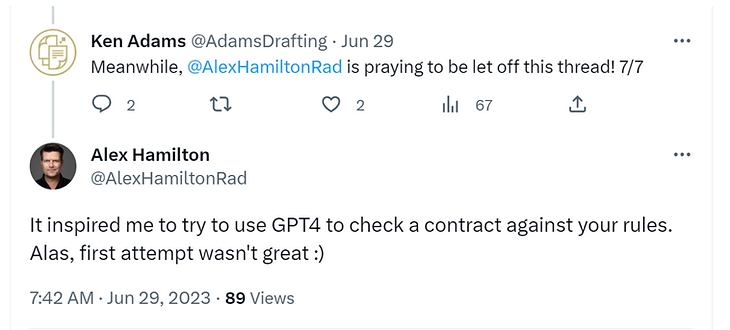Could You Use AI to Check Whether a Contract Complies with A Manual of Style for Contract Drafting?
Today someone asked me this in an email message:
Are you exploring training AI to incorporate A Manual of Style for Contract Drafting for proofreading contracts? I could see value in a plug-in that incorporates (in track changes) relevant proposed modifications after "learning" the contents of MSCD and applying it to all or part of a contract.
This isn't the first time I've encountered this idea. In a March 2023 blog post, Casey Flaherty says, "And maybe, someday, an LLM will be used to apply the sixth edition of Ken's MSCD to every contract destined for EDGAR."
And there's this 29 June 2023 tweet by Alex Hamilton: And there's this 29 June 2023 tweet by Alex Hamilton:

If Casey and Alex both casually air an idea, I'd be silly not to consider it.
I don't know that one needs to invoke artificial intelligence for systems that check whether a document complies with a set of guidelines. After all, WordRake and Grammarly would seem to be editing software rather than AI. But one could conceivably feed MSCD to a large language model (LLM). Doing so would in theory spare you the kind of work that has gone into WordRake and Grammarly.
Whether you use a WordRake/Grammarly approach or use an LLM, the question is whether the task is feasible. For three reasons, I suggest it's unlikely to work out well.
First, the dysfunction of mainstream contract language means that often you don't know what a given formulation is trying to accomplish. Take for example a limitation-of-liability provision that excludes consequential damages. It's not clear what the drafter had in mind, to the extent they had anything in mind other than copy-and-pasting. So a simple substitution of the WordRake/Grammarly sort isn't an option. Instead, the best one could do is point the user to the MSCD discussion of consequential damages (see this 2022 blog post). I could offer you many other such examples.
Second, the dysfunction of mainstream contract language doesn't just consist of single-vehicle accidents. Instead, you routinely get multiple-vehicle pile-ups, such that switching out suboptimal usage No. 1 for some standard alternative doesn't make sense because of how suboptimal usage No. 1 interacts with suboptimal usage No. 2, which in turn interacts with suboptimal usage No. 3. Often I end up discarding the original and instead say the same thing in an entirely different way. Currently, I don't think it would be realistic to expect any kind of technology to accomplish that.
And third, the dysfunction tends to be so dense that whatever your technology, from beginning to end it would have to hack through the jungle with a machete. As I jokingly suggested to Alex in our Twitter exchange, any machine faced with such a task would emit sparks and blue smoke. (For an example of that density, go to this 2021 blog post for (1) six extracts of the Salesforce master agreement that I annotated to describe the drafting shortcomings and (2) my reworked version of each extract.)
So it would seem unrealistic to expect technology to digest MSCD and present you with a suitably reworked draft of any contract you feed it. But I can think of two alternatives. So it would seem unrealistic to expect technology to digest and present you with a suitably reworked draft of any contract you feed it. But I can think of two alternatives.
One would be to use technology not to offer a rewrite, but instead to offer explanatory annotations, leaving it to the user to decide what kind of fixes to apply. That's what LegalSifter offers with their contract-review product; I've spend much of the past five years helping them with that.
But fixing mainstream contract drafting is a nuisance. You might want to consider instead a fresh start, but not of the sort that requires random copy-and-pasting or a protracted drafting-by-committee nightmare. The options for such a fresh start are currently slim to nonexistent. Let's see whether I can come up with something.
All that said, I remain open to other possibilities.
Note: Originally published on July 3, 2023, on the Adams on Contract Drafting website.
